|
All text & photos © Hilton Pond Center
- Although nature lovers in northerly sections of the U.S. are astounded periodically by massive outbreaks of 13- and 17-year cicadas, the Southeast deals annually with a mid-summer buzz that's often mislabelled as the call of a locust. Instead it comes from the "Dog-day Cicada" (above), named because it is particularly active in the hot, humid "dog days" of August. Cicadas (pronounced "sick-kay-duhs") are rather large insects, averaging slightly more than two inches long, but they make far more noise than their size might indicate. Seldom heard on summer mornings or on cool days, they serve as background music across the Piedmont when July and August sun puts on the heat.
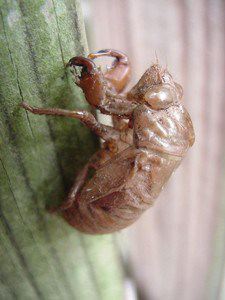 Many people are more familiar with juvenile cicadas, or at least their artifacts (right); those translucent, hollow, brown "bug shells" found on twigs and tree trunks are exoskeletons of the final nymph stage. The nymphs that shed those skins lived several years in the ground before emerging. Adults breed in the summer--the pulsating buzz of the male is his mating call--and the female lays eggs in a twig that usually withers and falls to earth. Eggs hatch and miniscule nymphs migrate into the soil, where they dine year-round on root juice. Many people are more familiar with juvenile cicadas, or at least their artifacts (right); those translucent, hollow, brown "bug shells" found on twigs and tree trunks are exoskeletons of the final nymph stage. The nymphs that shed those skins lived several years in the ground before emerging. Adults breed in the summer--the pulsating buzz of the male is his mating call--and the female lays eggs in a twig that usually withers and falls to earth. Eggs hatch and miniscule nymphs migrate into the soil, where they dine year-round on root juice.
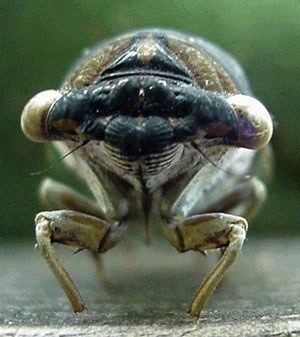 All cicadas and their relatives in the Homoptera (e.g., leaf hoppers, aphids, and scale insects) have long, narrow mouthparts (top & right) that they plunge, hypodermic-like, into plant parts. Immature cicadas burrow around, sucking up sugars from roots of perennial plants and molting into ever larger nymphal stages. Their sap-sucking habits probably have little effect on mature trees and shrubs; deaths of saplings and nursery stock usually come from destruction of twigs when adult females lay eggs. All cicadas and their relatives in the Homoptera (e.g., leaf hoppers, aphids, and scale insects) have long, narrow mouthparts (top & right) that they plunge, hypodermic-like, into plant parts. Immature cicadas burrow around, sucking up sugars from roots of perennial plants and molting into ever larger nymphal stages. Their sap-sucking habits probably have little effect on mature trees and shrubs; deaths of saplings and nursery stock usually come from destruction of twigs when adult females lay eggs.
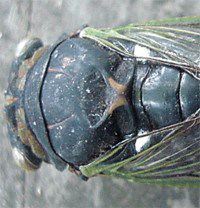 The male cicada makes his call with a pair of tymbals on top of his abdomen near the bases of the wings. These structures, each covered by a bright white flap in dog-day cicadas (right), contain ribbed membranes that bend rapidly back and forth as the insect breathes. The process is analagous to those Halloween noisemakers called "crickets," and the resultant clicks--which resonate in the cicada's nearly-hollow abdomen--are produced so rapidly that human ears hear only a flat buzz. In some species, the call attracts other males that congregate and create a loud chorus that, in turn, attracts females more quickly than would a solitary male. The male cicada makes his call with a pair of tymbals on top of his abdomen near the bases of the wings. These structures, each covered by a bright white flap in dog-day cicadas (right), contain ribbed membranes that bend rapidly back and forth as the insect breathes. The process is analagous to those Halloween noisemakers called "crickets," and the resultant clicks--which resonate in the cicada's nearly-hollow abdomen--are produced so rapidly that human ears hear only a flat buzz. In some species, the call attracts other males that congregate and create a loud chorus that, in turn, attracts females more quickly than would a solitary male.
All text, maps & photos © Hilton Pond Center
Comments or questions about this week's installment?
Please send an E-mail message to INFO.
 Be sure to scroll down for an account of all birds banded or recaptured during the week, plus other nature notes of interest. Be sure to scroll down for an account of all birds banded or recaptured during the week, plus other nature notes of interest.
"This Week at Hilton Pond" is written & photographed
by Bill Hilton Jr., executive director of
Hilton Pond Center for Piedmont Natural History.
You may wish to consult our Index of all nature topics covered since February 2000. You can also use the on-line Search Engine at the bottom of this page.
For a free, non-fattening, on-line subscription to "This Week at Hilton Pond," just send us an E-mail with SUBSCRIBE in the Subject line. Please be sure to configure your spam filter to accept E-mails from hiltonpond.org.
|
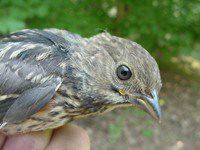

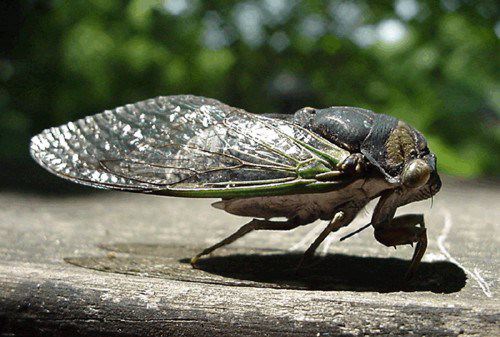
 Many people are more familiar with juvenile cicadas, or at least their artifacts (right); those translucent, hollow, brown "bug shells" found on twigs and tree trunks are exoskeletons of the final nymph stage. The nymphs that shed those skins lived several years in the ground before emerging. Adults breed in the summer--the pulsating buzz of the male is his mating call--and the female lays eggs in a twig that usually withers and falls to earth. Eggs hatch and miniscule nymphs migrate into the soil, where they dine year-round on root juice.
Many people are more familiar with juvenile cicadas, or at least their artifacts (right); those translucent, hollow, brown "bug shells" found on twigs and tree trunks are exoskeletons of the final nymph stage. The nymphs that shed those skins lived several years in the ground before emerging. Adults breed in the summer--the pulsating buzz of the male is his mating call--and the female lays eggs in a twig that usually withers and falls to earth. Eggs hatch and miniscule nymphs migrate into the soil, where they dine year-round on root juice. All cicadas and their relatives in the Homoptera (e.g., leaf hoppers, aphids, and scale insects) have long, narrow mouthparts (top & right) that they plunge, hypodermic-like, into plant parts. Immature cicadas burrow around, sucking up sugars from roots of perennial plants and molting into ever larger nymphal stages. Their sap-sucking habits probably have little effect on mature trees and shrubs; deaths of saplings and nursery stock usually come from destruction of twigs when adult females lay eggs.
All cicadas and their relatives in the Homoptera (e.g., leaf hoppers, aphids, and scale insects) have long, narrow mouthparts (top & right) that they plunge, hypodermic-like, into plant parts. Immature cicadas burrow around, sucking up sugars from roots of perennial plants and molting into ever larger nymphal stages. Their sap-sucking habits probably have little effect on mature trees and shrubs; deaths of saplings and nursery stock usually come from destruction of twigs when adult females lay eggs. The male cicada makes his call with a pair of tymbals on top of his abdomen near the bases of the wings. These structures, each covered by a bright white flap in dog-day cicadas (right), contain ribbed membranes that bend rapidly back and forth as the insect breathes. The process is analagous to those Halloween noisemakers called "crickets," and the resultant clicks--which resonate in the cicada's nearly-hollow abdomen--are produced so rapidly that human ears hear only a flat buzz. In some species, the call attracts other males that congregate and create a loud chorus that, in turn, attracts females more quickly than would a solitary male.
The male cicada makes his call with a pair of tymbals on top of his abdomen near the bases of the wings. These structures, each covered by a bright white flap in dog-day cicadas (right), contain ribbed membranes that bend rapidly back and forth as the insect breathes. The process is analagous to those Halloween noisemakers called "crickets," and the resultant clicks--which resonate in the cicada's nearly-hollow abdomen--are produced so rapidly that human ears hear only a flat buzz. In some species, the call attracts other males that congregate and create a loud chorus that, in turn, attracts females more quickly than would a solitary male.



